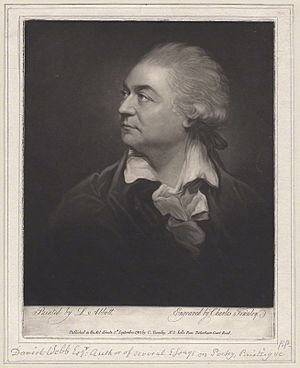Francis Webb (writer) facts for kids
Quick facts for kids
Francis Webb
|
|
|---|---|

Francis Webb by Charles Townley, after Lemuel Francis Abbott.
|
|
| Born | 18 September 1735 |
| Died | 2 August 1815 (aged 79) Barrington, Somerset
|
| Nationality | English |
| Occupation | Writer |
Francis Webb (born September 18, 1735 – died August 2, 1815) was an English writer. He is remembered for his essays, poems, and his work as a diplomat.
Contents
Francis Webb's Early Life and Education
Francis Webb was born in Taunton, England, on September 18, 1735. He was the third son of John Webb and Mary Sweet. Francis went to school in Abingdon and Bristol.
Becoming a Minister
After school, he studied to become a minister. He learned from important teachers like Philip Doddridge and Caleb Ashworth. He finished his training with Thomas Amory in Taunton. Francis became a minister for a church in Honiton. Later, he moved to London and worked at a church there until 1766.
A Career in Government and Diplomacy
After leaving his work as a minister, Francis Webb took on different roles. He worked for the government at Gravesend until 1777. This job involved checking ships.
Working with Important People
Francis Webb became friends with important people, including the Duke of Leeds, who was a government secretary. The Duke asked Francis to help with several important tasks.
In 1786, Francis traveled to Hesse-Cassel (a place in Germany). He went with Sir Isaac Heard to give a special award called the Order of the Garter to a local ruler.
Helping with Peace Talks
Later, in 1801, Francis went to Paris with Francis James Jackson. He worked as Jackson's secretary during talks to create a peace agreement called the Treaty of Amiens. French diplomats trusted Francis because they knew he had some sympathy for Napoleon's government. However, Francis left before the peace treaty was finished because he disagreed with some of the British plans.
Later Life and Writings
Francis Webb was a close friend of the artist Giles Hussey. He wrote about Hussey's life and art methods.
In 1811, while living in Lufton, Francis Webb became a Unitarian. This is a type of Christian belief. He passed away on August 2, 1815, in Barrington, near Ilminster. He was married to Hannah Milner in 1764, but they did not have any children who survived him.
A picture of Francis Webb was made by the artist Lemuel Francis Abbott.
Francis Webb's Published Works
Francis Webb wrote several books and poems during his life. Here are some of his notable works:
- "Sermons," published in London in 1766.
- "Thoughts on the Constitutional Right and Power of the Crown in the bestowal of Places and Pensions," published in London in 1772. This book discussed the government's power to give jobs and money.
- "An Epistle to the Rev. Mr. Kell, with an Ode to Fortitude," published in Salisbury in 1788.
- "Poems: on Wisdom; on the Deity; on Genius," published in Salisbury in 1790.
- "Ode to the rural Nymphs of Brasted," published in 1801.
- "Somerset: a Poem," published in London in 1811. This was a poem about the county of Somerset.
Some of his letters are also kept in the British Museum.
 | Emma Amos |
 | Edward Mitchell Bannister |
 | Larry D. Alexander |
 | Ernie Barnes |

